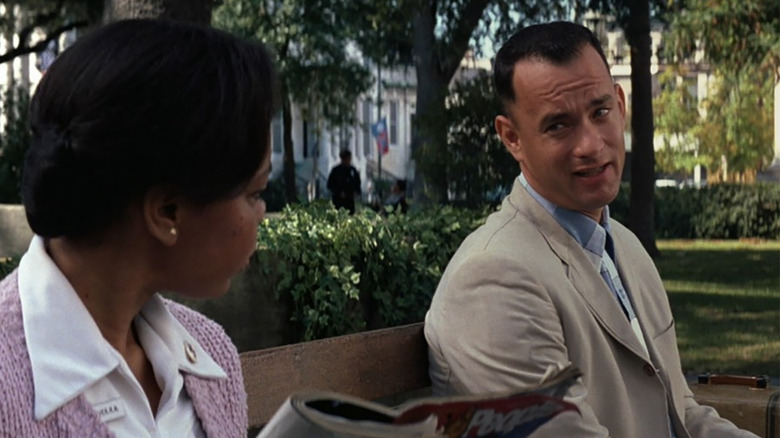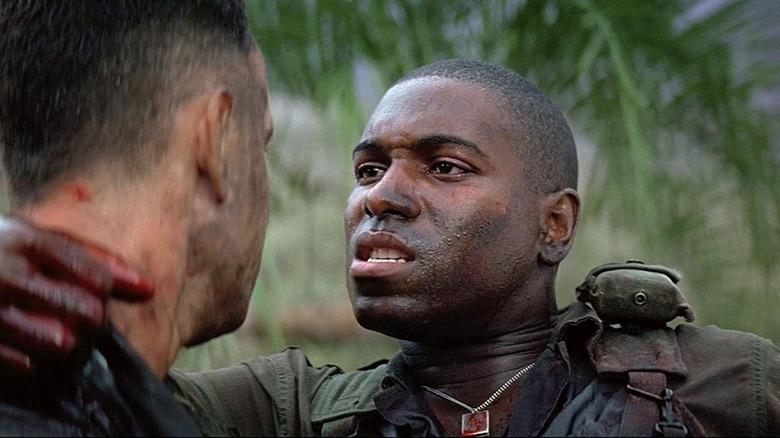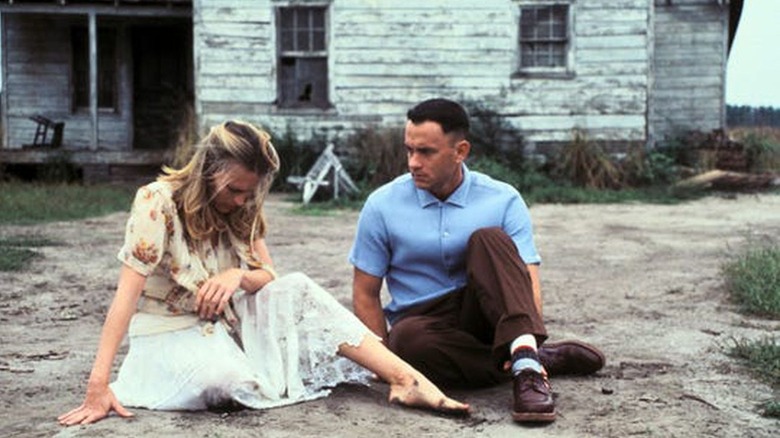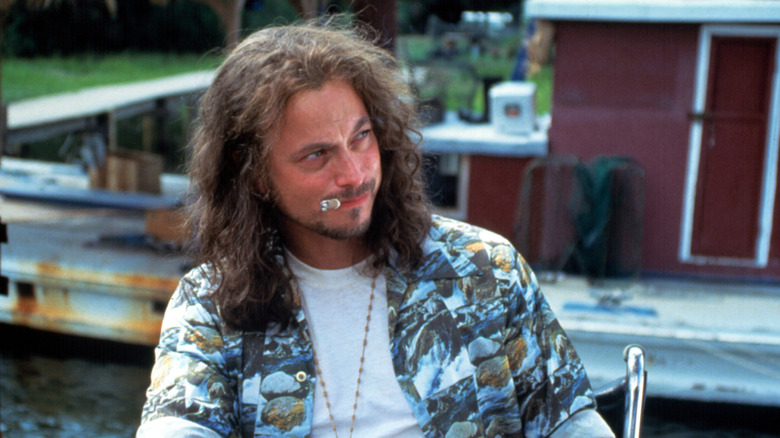Robert Zemeckis Made Some Cuts To Forrest Gump That Were Probably For The Best
I know I'll sound like an old fogey for saying this, but they don't make major motion pictures like "Forrest Gump" anymore. In our time of endless Marvel movies, the "Fast and Furious" franchise, and immense effects-heavy spectacles like "Dune," it's hard to believe that Robert Zemeckis cleaned up at the box office nearly 30 years ago with a sentimental tale of a simple man sitting on a bench, recounting the improbable story of his life to total strangers.
You might have forgotten that "Forrest Gump" even had state-of-the-art special effects, but if you compare them to Arnold Schwarzenegger reversing a jet fighter into a skyscraper in "True Lies" from the same year, they are so seamless and unobtrusive that you barely notice them. Instead, Zemeckis' special effects were in service of a story about a kind-hearted man with a low IQ, his childhood love, his wise mama, and the friends and surprising successes he finds as he unwittingly gatecrashes famous moments in history.
Played with winning openness by Tom Hanks, Forrest's adventures take him from his sleepy hometown in Alabama to the White House, Vietnam, playing ping-pong in China, running across the United States, and starting his own shrimping business. It's whimsical Americana at its most nostalgic, which prompted some backlash about the message it was truly conveying, but at its heart "Forrest Gump" is a simple story of love and friendship set against a backdrop of 25 years of tumultuous history.
For all its quixotic touches, "Forrest Gump" would have been even more fantastical if screenwriter Eric Roth had his way.
So what happens in Forrest Gump again?
From the opening strains of Alan Silvestri's touchy-feely score, we know exactly what kind of movie "Forrest Gump" is. A spiraling feather finds its way to the well-worn sneaker of a man sitting on a bench at a bus stop. This is Forrest Gump (Hanks), and he engages anyone unwise enough to share the bench with him, resulting in endless stories about his past, peppering his epic tale with folksy nuggets of wisdom like comparing life to boxes of confectionery.
His story takes us back to 1956 in Greenbow, Alabama, where Forrest remembers his "magic shoes" he was forced to wear as a child to straighten his crooked spine. He routinely suffers abuse from his smarter classmates, but makes friends with a lonely, abused girl named Jenny. While fleeing from a gang of bullies, Forrest's leg braces miraculously fall apart and he's off, leaving them eating dust. Forrest is a very fast runner, and his talent runs him all the way to the White House as part of the United States All-Star football team.
Meanwhile, Jenny (Robin Wright) grows up to embrace the counterculture movement as a free-loving hippie. Forrest signs up for the army instead, and he ends up in Vietnam with his new best buddy Bubba (Mykelti Williamson), another simple man who has a burning passion for shrimp. Under the command of Lieutenant Dan (Gary Sinise), Forrest's unit is ambushed by the Viet Cong. His fast legs help him save several men from certain death, although Bubba is mortally wounded and Dan loses both his legs.
Returning to the States as a war hero, Forrest keeps his promise to Bubba by buying his own shrimping boat, inviting an embittered Lieutenant Dan to help out. This is Forrest's first step towards becoming a millionaire. But it's the heart of Jenny that brings him the most happiness, even though she ends up leaving him behind along with their son after succumbing to AIDS.
The problem with Forrest Gump
It's easy to be skeptical about "Forrest Gump," especially if its baked-in message of conformity rankles you. Forrest just bumbles through life following orders, adhering to every rule and barked order from his superiors, and winds up a war hero and a very rich man. Meanwhile, Jenny strikes out on her own and questions authority by attending anti-war rallies and hanging out with the Black Panthers, and she's punished for challenging the norm by winding up dead. In the world of the film, conformity is the only right, clean, and safe way through life, while rebelling and kicking back against "The Man" is portrayed as aberrant and dangerous.
Some critics at the time picked up on this aspect of "Forrest Gump," and a longview has given its detractors even further cause to sharpen their knives. As Eric Kohn of IndieWire wrote:
"Movies provide windows into the world and the way it fits together; by that very definition, they take on political ramifications, especially when they utilize images loaded with preexisting definitions. As "Forrest Gump" careens through Americana, it can't help but cast its gaze at the country's fiery counterculture and roll its eyes. That strikes a notable contrast to the radical energy of several movies released the same year, including Spike Lee's "Crooklyn" and "Natural Born Killers," which provide much savvier explorations of American society and its various fragmented pieces through their sharp narrative frameworks."
I agree with these criticisms from a distance, but all critical sensibilities get switched off when I actually watch the movie. It's such an enjoyable ride, and like "Back to the Future" previously, Zemeckis is just so good at sweeping you along with his infectious storytelling. A huge part of the charm comes from the performance from Hanks, who is flawless, landing him back-to-back Oscar wins after his portrayal of the AIDS-stricken lawyer in "Philadelphia."
"Forrest Gump" romped home with over $330 million at the domestic box office (via Box Office Mojo), more than double that of the more traditionally action-packed blockbuster "True Lies." It also dominated the Oscars, nominated for a whopping 13 awards and winning Best Picture, Best Director, Best Actor, Best Adapted Screenplay, Best Editing, and Best Visual Effects. But did it deserve Best Picture and Director over "Pulp Fiction" that year? Don't get me started on that.
Forrest Gump could have been far more effects-heavy
Eric Roth's original screenplay had some quirks that would have made the special effects in "Forrest Gump" far more noticeable, which Hanks, Zemeckis, and Roth discussed during a panel at USC in 2009 (via Cheat Sheet). He had Forrest interacting with an animated monkey, perhaps giving a nod to the incident in Winston Groom's novel where our hero becomes an astronaut and goes to space with an unruly primate. Lieutenant Dan and Jenny also had animated extras too, with Dan followed around by a black cloud over his head, and Jenny adorned with a pair of angel wings.
How would that have worked out? It depends on the animation technique they used, but the latter two would have been fairly straightforward, even with the CGI of the time. A few years later, "Twister" gave us some weather effects that are still fairly convincing, so that might have taken care of the cloud.
As for Forrest's chimp companion, we can perhaps glean some clues about how that might have turned out from the raucous gang of monkeys in "Jumanji," which didn't look especially realistic even at the time. If Zemeckis, who had brilliant form combining real actors with cartoon characters in "Who Framed Roger Rabbit?" in 1988, had gone with the more traditional animated route, he might have pulled it off. According to Zemeckis during the panel, he suspected that work on "Roger Rabbit" was why the producers wanted him in the first place. Zemeckis recalled:
"Forrest always had Curious George as a talking monkey talking to him... I don't know if this is true or not, but I always had the feeling that because I did "Roger Rabbit," that's how they sent me the script because they said, 'get the guy who can do the cartoons and the humans together.' The first thing I said was, 'I'll do this but all this cartoon stuff has to go.'"
It was a wise decision from Zemeckis, as the inclusion of a talking chimp may have irreparably broken the spell of the otherwise low-key special effects, not to mention making the emotional core of the movie far more ham-fisted. Less was definitely more for this enduringly popular classic, and Curious George still remained in the final film as Forrest's favorite book.



